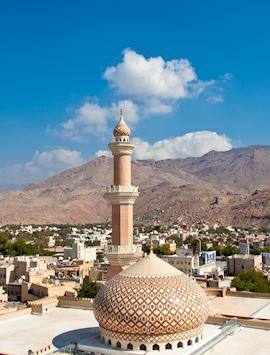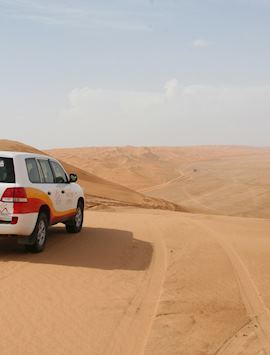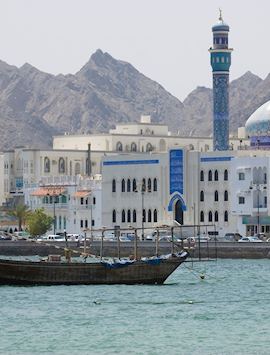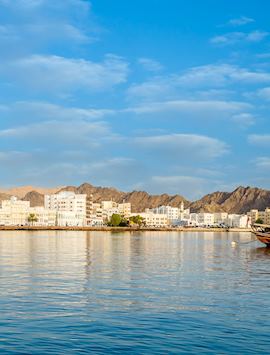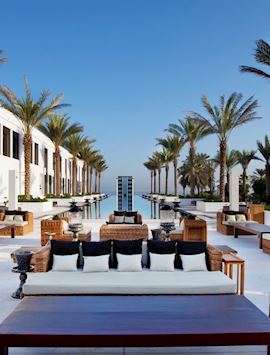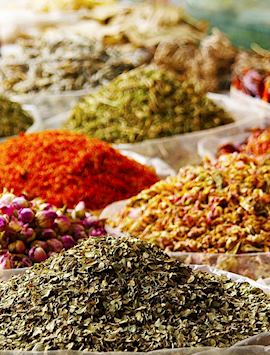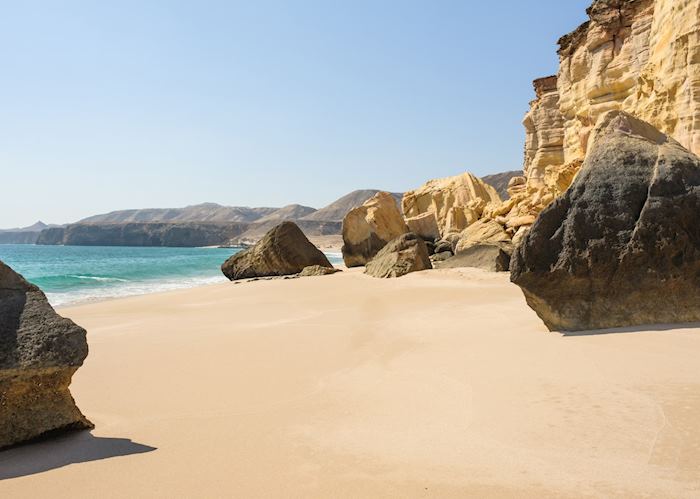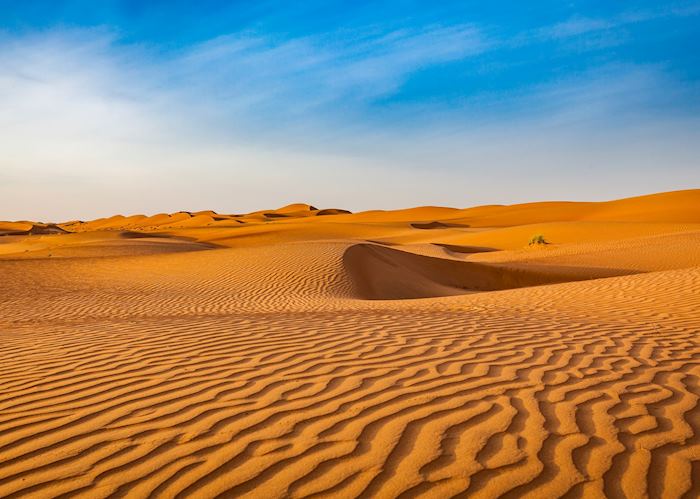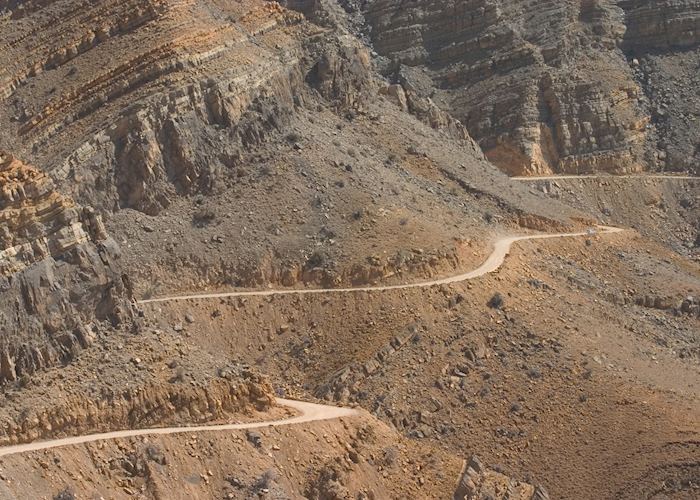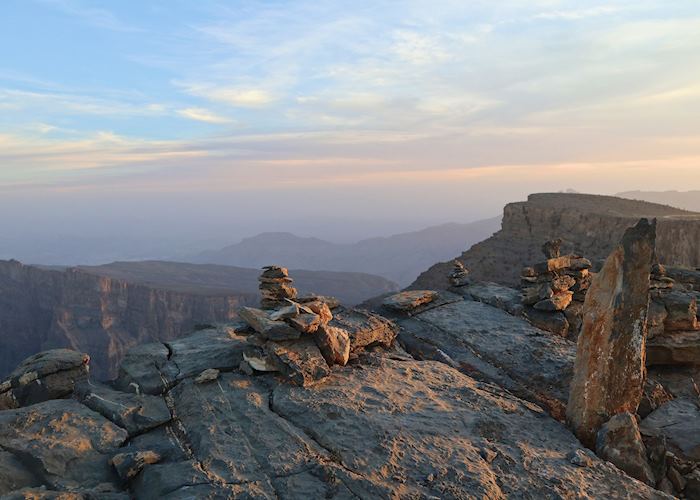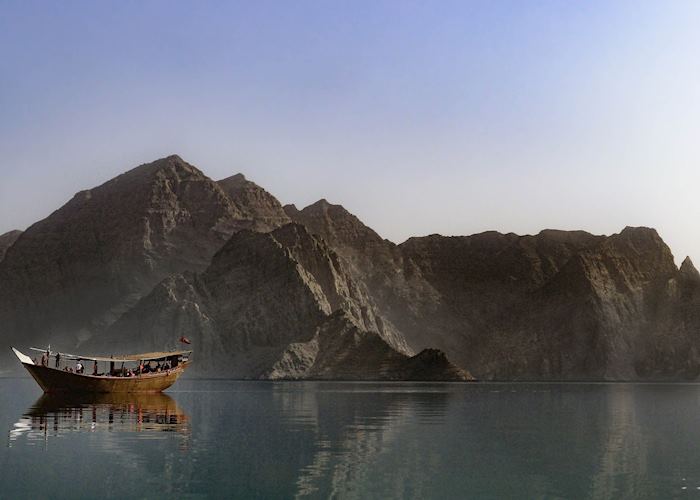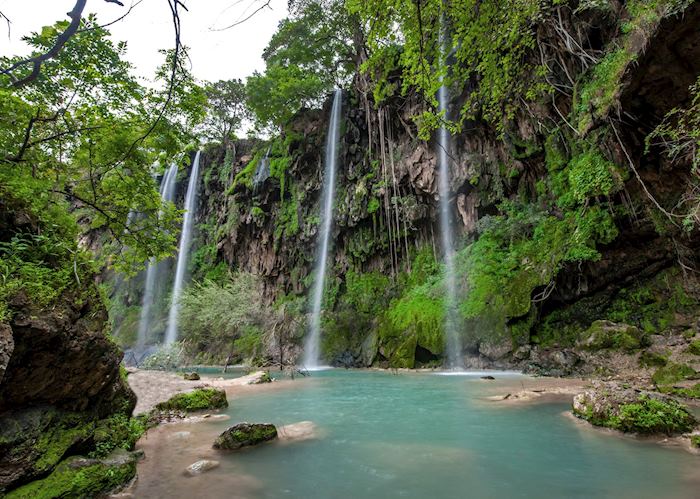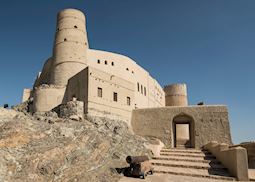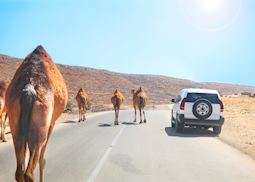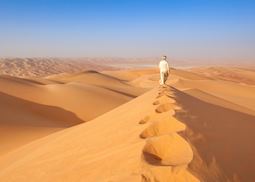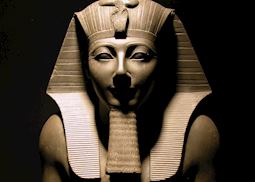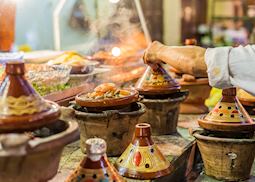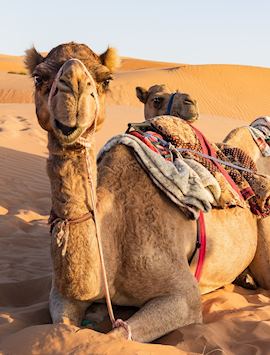
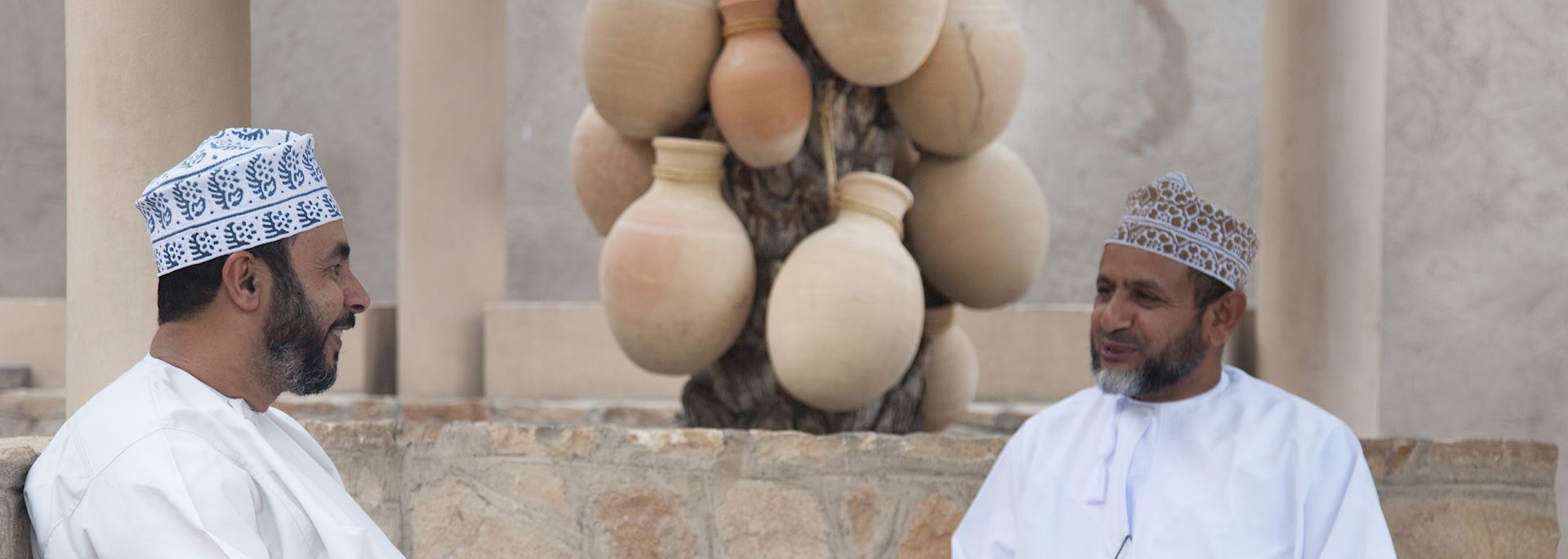
Tailor-made Oman holidays shaped around your passions
The Middle East’s best-kept secret, Oman combines unspoiled desert landscapes with a chance to experience authentic Arabian culture. Stable and international in its outlook, Oman has none of the ostentation of its sister states. Instead, you’ll find pristine beaches, golden deserts and mountain scenery, as well as traditional villages where goats roam freely through the narrow streets. Our specialists visit regularly so they can tailor your holiday to Oman to your interests.
Modern Muscat has avoided over-development and remains refreshingly low-rise, despite its endless white-sand beaches. Beyond the capital, you’ll find ancient tombs, stately forts and hidden wadis in the Jebel Akhdar Mountains. In the traditional city of Nizwa, you can visit the Friday livestock market, where goats, camels and cows are paraded for sale. Explore the Wahiba Sands in a 4x4 and then watch the sun slowly set, unfurling a blanket of stars across the endless night sky.
Suggested tours for Oman
These tours give you a starting point for what your holiday to Oman could entail. Treat them as inspiration, as each trip is created uniquely for you.
Why travel with Audley?
- 100% tailor-made tours
- Fully protected travel
- Established for over 25 years
- 98% of our clients would recommend us
Best time to visit
Our specialists advise on the best months to visit Oman, including information about climate, events and festivals.
Request our brochure
Covering all seven continents, The World Your Way shows you how you can see the world with us. It features trip ideas from our specialists alongside hand-picked stays and experiences, and introduces our approach to creating meaningful travel experiences.
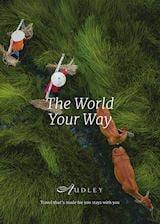
Useful information for planning your holiday in Oman
Modern Standard Arabic is the official language of Oman, but you’ll hear people speaking various Arabic dialects in conversation. English is also widely spoken, and you may hear Hindi, Swahili, and Baluchi on the streets, too.
The currency of Oman is the Omani rial (OR or OMR). You’ll find ATMs in all major towns and cities, and credit cards are widely accepted.
In Oman, you should try meshkak (grilled skewered meat), mahuai (grilled kingfish with a lemon sauce), and majoboos (a mix of rice, meat, and vegetables). Shuwa (slow-cooked, spiced meat) is popular on special occasions, and Omani bread is a varied staple and is often flecked with dates, sesame, thyme, and garlic.
For dessert, try halwa (a confectionary made from sugar, eggs, honey, and spices) or Oman’s succulent dates. Laban (a salty buttermilk) is also popular, as are yoghurt drinks with cardamom or pistachio.
You should tip around 10% at hotels and restaurants in Oman.
For the latest travel advice for Oman, including entry requirements, health information, and the safety and security situation, please refer to the Foreign, Commonwealth & Development Office website.
You’ll find unspoilt desert landscapes, traditional Bedouin culture, pristine beaches, and ancient tombs in Oman. One of the highlights of a trip is the variety of things to see and do. Oman often doesn’t come to mind first when thinking of a Middle Eastern destination, but it surprises most visitors with its mountains and fjords, dolphin and whale watching, and delicate architecture.
For example, you could spend a night under the stars in a desert camp, watch turtles lay eggs on the beach, visit traditional villages and livestock markets, or explore the mellow city of Muscat with its thriving souqs and imposing forts. Alternatively, you could venture into Oman’s interior to explore plains and mountains or tour historic towns and dramatic canyons, head for the coast to take a dhow cruise through steep-sided fjords, or simply spend some time relaxing on the beach.
In Oman, you can stay in traditional palatial buildings, sleek, modern resorts, boutique hotels, and desert camps. Muscat offers a good choice of places to stay with everything from luxurious international hotels with pools, spas, and tennis courts to a former’s Sultan’s residence set in lush gardens on a private beach.
Outside the capital, the options are more limited and range from simple but comfortable hotels to pool-side villas by a private marina, as well as a Bedouin camp deep in the desert dunes. To get an idea of what’s on offer, browse our collection of places to stay in Oman.
In Oman, most visitors head to Muscat, Nizwa, and other coastal regions. In the low-rise capital of Muscat you’ll find white-sand beaches as well as the Sultan’s Palace, twin forts guarding the port, and a Portuguese influence in the historic architecture. Head to Nizwa and the surrounding mountains for dramatic scenery, massive fortresses, and lively markets.
In the remote Musandam Peninsula, you can sail on a dhow in crystal-clear waters, while in Ras al Jinz you can watch as greenback turtles come ashore to nest. For something a little different, you can explore empty desert dunes and learn about Bedouin culture in the Wahiba Sands or fly to Salalah for palm-fringed beaches, a dramatic coastline, waterfalls, and frankincense trees.
The best time to see turtles nesting in Oman is from May to September. Ras al Jinz is one of the largest nesting sights and the best location to see them with 50 to 60 green turtles nesting here each day in this season. You might also see turtles here over the winter months but in much smaller numbers.
It takes around eight hours to fly from the UK to Oman.
The time zone in Oman is UTC+4 hours. Oman does not observe Daylight Savings Time.
The best way to get around Oman is either to drive shorter distances or take domestic plane journeys for longer distances. Renting a 4x4 is straightforward and will get you out into the desert interior with complete freedom, but if you’d prefer a driver-guide we can easily arrange this for you.
Use our travel tool to find up-to-date visa and passport requirements for Oman. Enter where you’re travelling to and from (including any stopover destinations en route or flight layovers), along with your intended travel dates and passport details, for a full list of requirements.
Your doctor can provide you with vaccine advice for Oman, but you should also ensure you’re up to date with the recommended vaccinations for your home country. You can also check the suggested vaccinations on the Travel Health Pro website.
Oman is noticeably quieter during the day in Ramadan, but livelier at night. Practising Muslims fast from dawn until dusk during Ramadan and you should not eat, smoke, chew gum, or drink in public during daylight hours out of respect.
Although days are quiet and many restaurants remain closed, you can still eat at your hotel. By contrast, the evenings during Ramadan feel festive with people spilling out onto the streets to break their fast, meet friends and family, and stroll through parks or along the beach. At the end of Ramadan, Omanis celebrate Eid al Fitr for four days and local businesses may close during this time.
Both men and women should dress modestly while in Oman. While shorts are fine on the beach or at your hotel pool, you should always cover your shoulders and knees anywhere else in public. Loose, long clothing shows respect for the traditional values held in this conservative Muslim country. Women should also carry a scarf to cover their heads at mosques.
In Oman, it’s recommended to follow local etiquette by greeting people with a smile, eating with your right hand, and not using rude gestures of any kind. Other things to remember include using an open palm to gesture toward something, asking permission before taking a photo of anyone, and never taking photos of military establishments.
Members of the opposite sex don’t generally touch, so men should allow women to extend their hand first rather than offering a handshake in greeting. When eating out you may be offered a hot towel before the start of a meal, which you should use to clean your hands. After you’ve finished eating, leave your plates as they are, stacking the plates for waiters to collect is considered impolite.
If you’re lucky enough to be invited to a private home, bring a small gift, remove your shoes at the door, and eat whatever is offered.
Oman in pictures
Our expert guides to travelling in Oman
Written by our specialists from the viewpoint of their own travels, these guides will help you decide on the shape of your own trip to Oman. Aiming to inspire and inform, we share our recommendations for how to appreciate Oman at its best.
-
![My Travels in Oman]()
My travels in Oman
Oman specialist June shares footage from her trip to Oman including Sultan Qaboos mosque, the souqs of Muscat and the Bimmah Sinkhole.
-
A guide to visiting Oman for the first time ![Bahla Fort, Oman]()
A guide to visiting Oman for the first time
A guide to visiting Oman for the first time
Oman’s understated pleasures make it a great introduction to the Middle East. Snorkel in the Arabian Sea, visit a traditional fish souq or livestock market, and stand alone at the edge of the Omani Grand Canyon.
Read this guide -
Self-drive Oman: Deserts, mountains and markets for the adventurous ![Traffic jam, Oman]()
Self-drive Oman: Deserts, mountains and markets for the adventurous
Self-drive Oman: Deserts, mountains and markets for the adventurous
For confident drivers, Oman makes an adventurous self-drive destination, says specialist Paula. You can venture into the towering golden dunes of the Wahiba Sands, navigate winding mountain roads and see goats sold at the timeless Nizwa livestock market.
Read this guide -
Family holidays in Oman ![Turtle, Ras Al Jinz]()
Family holidays in Oman
Family holidays in Oman
Peaceable Oman provides a family-friendly introduction to the Middle East. From camping out in the desert to discovering hatchling turtles, children can feel like explorers while parents are reassured by the country’s stable history.
Read this guide -
Travel into Oman's Empty Quarter ![Man walking in Oman's Empty Quarter]()
Travel into Oman's Empty Quarter
Travel into Oman's Empty Quarter
Adventure into the Empty Quarter in Oman. Journey across this vast desert region, surrounded by nothing but rolling sand dunes for as far as the eye can see and camp beneath a blanket of stars.
Read this guide



